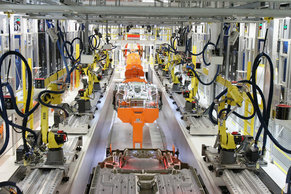Productivity
Telecommuting requires management by objectives whereby employees are given goals and evaluated according to their performance in achieving these goals. There are no points for showing up. This can improve productivity if implemented well.Benefits
Some employees view telecommuting as a benefit. This is a benefit that is no-cost. In fact, it is likely to reduce the employer's costs.Resilience
The ability to work from anywhere with an internet connection increases resilience to disasters and other work disruptions. This is particularly true where a firm has highly resilient IT infrastructure that supports telecommuting tools.Flexibility
Eliminating the culture of meeting in physical rooms can improve flexibility. For example, it may encourage employees in different cities and countries to cooperate as they are just as easy to contact as coworkers in the same city.Overhead Costs
Employers often incur significant costs to provide office space and services. The costs of electronic tools for working at home are far less. In theory, employers could pay employees more to compensate them for providing their own office space, equipment and supplies.Tax Advantages
By asking employees to work from home, employers are requiring employees to provide their own office space. In principle, this should be tax deductible for the employee. Likewise, any office equipment and supplies purchased by the employee should be deductible. This isn't tax advice, as different tax authorities have their own rules regarding this deduction.Commuting
Telecommuting reduces or eliminates commuting. This can dramatically boost productivity and employee morale. It also reduces their transportation costs. For example, a telecommuting family may only need a single car as opposed to two vehicles.Environment
Reductions in commuting translate to decreased energy use and other benefits such as improved air quality in a city.Cities
Telecommuting is likely to completely change cities as workers can live further from work and roads become less busy. This may have both advantages and disadvantages. For example, it may greatly increase land use as people move to large houses in the suburbs or countryside. Telecommuting may allow roads to be repurposed for recreation, walking, cycling, small electric vehicles, community environments and beneficial commercial use such as cafe terraces.Recruiting
Telecommuting increases the pool of talent that can be recruited for a position. For example, a bank in New York that begins to recruit software developers from any state without having to relocate them.Work-Life Balance
Being close to home allows employees to more easily balance work with life demands such as parenting. For example, a parent can more easily take a child to a doctor's appointment or sporting event when they work from home.Reduced Absences
Reduced absences due to transportation conditions such as snow or transportation strikes. Employees are also be likely to work when they have a mild illness such as a cold that may not be acceptable in an office environment. Another common source of absences is employees who need to take care of a sick child at home. Such employees are likely to continue to work where given flexible telecommuting working conditions. Telecommuting employees are also more likely to accept requests after hours and on weekends in exchange for more flexibility during core hours.Employee Satisfaction
In some cases, telecommuting increases employee satisfaction due to factors such as increased flexibility and elimination of their commute. This isn't always the case as some employees will begin to feel isolated at home.Disadvantages
The biggest inherent disadvantage of telecommuting is that employees may feel disconnected and isolated without the shared experience of interacting with coworkers in person. This can be easily solved by requiring employees to all come to work on certain days and focusing on group activities and communication on these days. This should always have a social component such as lunch at a restaurant.Some industries have inherently lower productivity without people in the same room. For example, there is no known way to implement a complex and efficient production line with telecommuting.Other disadvantages are related to implementation. For example, there is nothing inherently less secure about telecommuting but if implemented poorly, it may greatly increase information security risk. Firms implementing telecommuting for the first time should expect challenges as efficient implementation requires a culture shift whereby norms, expectations and habits need to change.| Overview: Telecommuting | ||
Type | ||
Definition | The process of working from remote locations such as an employee who works from home. | |
Also Known As | Work From HomeWFHRemote Work | |
Related Concepts | ||


































